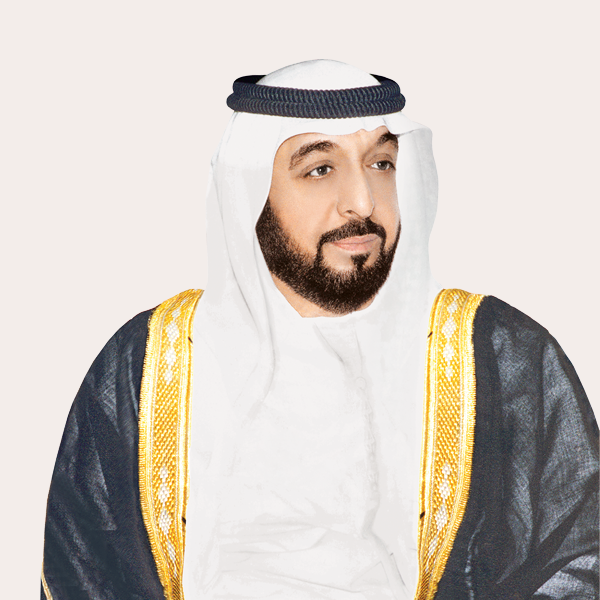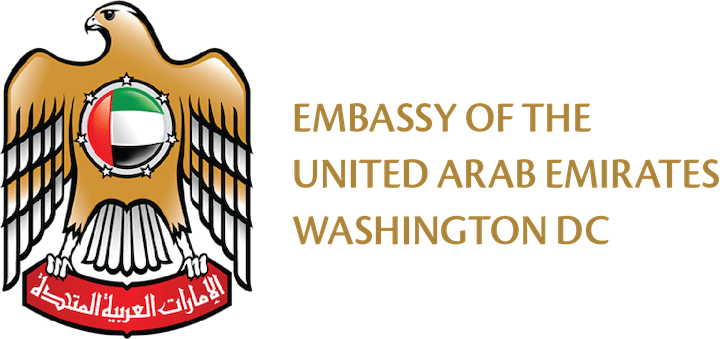HH Sheikh Khalifa bin Zayed Al Nahyan, Ruler of Abu Dhabi, was elected as the new President of the United Arab Emirates on 3 November 2004, to succeed his father, the late HH Sheikh Zayed bin Sultan Al Nahyan, UAE President from 1971 to 2004. On May 13, 2022, Sheikh Khalifa passed away.

When HH Sheikh Khalifa was the President of the UAE, he presided over a major restructuring of both the Federal Government and the government of the Emirate of Abu Dhabi. The appointment of a new Cabinet in February 2006, with Vice-President and Dubai Ruler HH Sheikh Mohammed bin Rashid Al Maktoum as prime minister, saw major changes in the government’s structure. These included new ministries devoted to streamlining and modernizing the government, a new focus on community development and an important step towards reforming the political process through introducing indirect elections for half of the Federal National Council’s membership.
Early in his presidency, HH Sheikh Khalifa took extensive tours throughout the UAE to study the needs of the northern Emirates. Assessing the need, he commenced a number of projects to build housing and schools and provide other social services.
HH Sheikh Khalifa also implemented dramatic changes in the government of Abu Dhabi, including improving public services and opening up the economy to encourage investment and public-private partnerships. During the early years of the Federation, he believed it was right and appropriate for government to play the leading role, but now, with a burgeoning private sector and with a well-educated population, the time is right for both local and federal government to step back and concentrate on the core areas of government responsibility.
While emphasizing the need for a restructuring at home, not just in terms of government, but also in how the people of the UAE look at their own societal responsibilities HH Sheikh Khalifa continued to ensure that the country pursues an active foreign policy.
HH Sheikh Khalifa demonstrated his commitment to build relations with other countries. Under his leadership, the UAE provided emergency assistance at times of natural disaster, responding immediately in sending help after events such as Hurricane Irma, which battered the US and Caribbean in 2017, and the devastating earthquake and tsunami that hit Indonesia in 2018. During his tenure, the UAE became the world’s largest donor of humanitarian assistance relative to national income, as reported by the Organization for Economic Cooperation and Development in 2018.
HH Sheikh Khalifa was a strong supporter of the six-member Gulf Cooperation Council (GCC), believing that the success and achievements of this body reflect the depth of understanding reached amongst its leaders.
1948: HH Sheikh Khalifa is born in the inland oasis-city of Al Ain.
1966: HH Sheikh Khalifa is appointed Ruler’s Representative in the Eastern Region of Abu Dhabi and Head of the Courts Department in Al Ain.
1969: HH Sheikh Khalifa is nominated Crown Prince of Abu Dhabi and appointed Head of the Abu Dhabi Department of Defense, directing the Abu Dhabi Defense Force (ADDF) and later the UAE Armed Forces.
1971: HH Sheikh Khalifa is appointed Prime Minister of Abu Dhabi and Minister of Defense and Finance.
1974: HH Sheikh Khalifa is appointed first Chairman of the Abu Dhabi Executive Council. In this role, he leads a wide-ranging development program in the emirate, including the construction of housing, water supplies, and infrastructure, leading to the emergence of the modern Abu Dhabi that exists today.
1976: HH Sheikh Khalifa is nominated Deputy Supreme Commander of the UAE Armed Forces following the unification of the armed forces of the Emirates. He proceeds to develop the country’s defensive capability, establishing military training institutions and procuring the most advanced technology.
Sheikh Khalifa establishes the Abu Dhabi Investment Authority to manage the financial investments of the emirate and ensure a stable and prosperous future.
1979: HH Sheikh Khalifa decides to alleviate the burden on citizens of repaying commercial bank loans, leading to him establishing the Abu Dhabi Department of Social Services and Commercial Building in 1981.
HH Sheikh Khalifa established the Khalifa Housing Fund in order to provide cheap finance for the construction of residential and commercial buildings for nationals. The initiative was widely credited for starting the construction boom in Abu Dhabi.
1991: HH Sheikh Khalifa establishes the Private Loans Authority to further support citizens in building residential and commercial properties.
HH Sheikh Khalifa oversaw the reshaping and rearming of the UAE’s Armed Forces to play their part in Desert Storm, the US-led offensive to drive Iraqi troops from Kuwait.
2003: HH Sheikh Khalifa oversaw the UAE’s economic development, as its gross domestic product rose to a growth rate of about 13% a year since the birth of the nation.
2004: HH Sheikh Khalifa is elected President of the UAE, succeeding his father, founder of the UAE Sheikh Zayed bin Sultan Al Nahyan.
2005: HH Sheikh Khalifa outlined during his second National Day address plans to reform the government and the role of the Federal National Council. He pursued a political grant that enabled women to participate for the first time in the elections of the FNC.
2006: HH Sheikh Khalifa oversees the restructuring of the UAE Cabinet, with Vice-President and Dubai Ruler HH Sheikh Mohammed bin Rashid Al Maktoum becoming Prime Minister.
2007: HH Sheikh Khalifa established the Khalifa Bin Zayed Al Nahyan Foundation which brought additional health, education, housing, electricity, transport and water services to remote areas in the Northern Emirates.
2008: HH Sheikh Khalifa oversaw the publication of the UAE Policy on the Peaceful Use of Nuclear Energy. The UAE agreed to be a responsible member of the global nuclear community, committed to transparency, safety and security.
2009: HH Sheikh Khalifa was re-elected as President, pledging to continue implementation of his strategies for political, administrative, economic, social and cultural development.
2010: Burj Dubai is renamed Burj Khalifa in honor of HH Sheikh Khalifa.
2011: HH Sheikh Khalifa ordered the establishment of the debts settlement fund to help heavily indebted Emiratis settle their loans.
2012: In 2012, HH Sheikh Khalifa launched Absher initiative to enhance the participation of UAE citizens in the labour market.
2014: The Emirates Polio Campaign was launched under the directives of President His Highness Sheikh Khalifa bin Zayed Al Nahyan and His Highness Sheikh Mohamed bin Zayed Al Nahyan, Crown Prince of Abu Dhabi, to provide help and humanitarian assistance to the people of Pakistan and support their development initiatives for a better future.
2015: Under the directions of Sheikh Khalifa, the UAE Cabinet approved the designation of 2015, as the Year of Innovation.
2017: HH Sheikh Khalifa declared 2017 as the Year of Giving. Under this initiative, the focus was to strengthen social responsibility in the private sector, promote a spirit of volunteering, and strengthen the concept of serving the nation in new generations.
2019: HH Sheikh Khalifa issued a Presidential Resolution towards raising women’s representation in the Federal National Council (FNC) to 50 percent.
2021: HH Sheikh Khalifa, having established the Emirates Nuclear Energy Corporation, oversaw commercial power generation begin at the Barakah Nuclear Energy Plant.
2022: On May 13, 2022, Sheikh Khalifa passed away.
